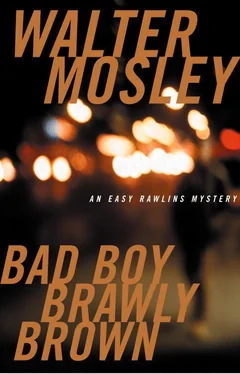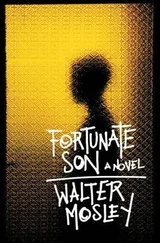Odell took one more shot of scotch while I sipped on my lemonade. After our drink he got my gloves and rifle. The gun was all broken down in a leather case. I gave him the phone number with a little speech I wanted him to recite at seven-thirty.
I parked out back in an alley behind the empty office building next to the used-car lot and across the street from John’s building. I jimmied open the back door and then forced my way into an office on the third floor. That was 6:35.
I opened the window and sat there in the twilight thinking that Mouse was advising me even after he was gone.
I thought about him and Etta, about their crazy life. There was no rancor or condemnation in my thoughts. We had all made it by sheer dumb luck. Any poor black child of the South who woke up in the morning was lucky if he lived to make it to bed that night. You were bound to be beaten, stabbed, and shot at least once or twice. The question wasn’t if you were going to get killed, it was, were you going to get killed on that particular day?
“Easy,” Mouse would say to me. “You know you just too sensitive. You think that you can keep somethin’ bad from happenin’ here or there. But that kinda power ain’t in your reach. It was all settled a long time ago. What happens with you — when you get borned, when you die, who you kill, who kills you — that was all writ down in your shoes and your blood. Shit. You be walkin’ down the road outside’a Pariah, hopin’ that New Orleans is just beyond that yonder stand of live oaks. But it ain’t. No, baby, you want it, you want it bad, but there’s just more swamp after them trees, and more swamp after that.”
My respect for Raymond was intense because he never worried about or second-guessed the world around him. He might have gotten tired now and then, but he never gave up. When I thought about that, I knew I had to go search out his grave.
At 7:15 I put my watch on the windowsill and opened Odell’s gun case. That .25-caliber rabbit gun was his pride and joy. I screwed in the barrel and fit the cherrywood stock into place. The best part of his rifle was its telescopic sight. Back when I first came to L.A., Odell would go out hunting and come back with enough rabbits to feed Maudria, him, and me — and two or three others besides.
I filled the magazine and pointed the muzzle through the window at the front door. I held that pose, glancing at the Gruen now and then. At 7:30 I knew that Odell was making the call.
“The cops!” Odell would have yelled. “The cops comin’!” And then he’d hang up.
At 7:32 the door swung open. Brawly came lumbering out with a large paper bag in his arms. When he turned back to the open door, I fired the first shot. He yelled in pain and fell to the ground. I fired again. From the open door Conrad emerged. He screamed something and made to grab Brawly by his arm. I fired again. That bullet missed Conrad. He was so scared that he dropped the bag he was carrying and fled down the street.
I raised my sight to the upper floor. John came out. When he saw the prostrate boy, he ran for the stairs. I had never seen John run before.
I turned over on my back, broke down the rifle, packed it away, and headed for the stairs. Within minutes I was in my car and driving back to my own home and my own children.
Jesus read to me from Moby-Dick and Feather bragged on her good math test. Bonnie served me reheated lamb shank in a cognac gravy, and I started on chores that I’d ignored for days.
No one called. There was going to be a robbery in the morning, but there was nothing I could do about that.
Before I went to bed I called Primo. “Hey, Easy. How you doing?”
“How’s the girl?” I asked.
“Still a little dizzy,” he replied. “Flower been giving her a special tea that makes her sleep.”
“You can stop that in the morning,” I said.
“Easy?” Bonnie asked, lying there next to me. I was staring at the ceiling, wondering if I’d get a wink.
“Yeah?”
“Did you finish with that business about Alva’s son?”
“Yeah. Finished.”
“Is he in trouble?”
“Not no more he ain’t.”
“John is really lucky to have a friend like you.”
“Yeah,” I said. “Lucky as a prize pig after the county fair.”
I heard it on the radio at ten-thirty. Three black men and one white woman had gotten into a shootout with the city police and county sheriffs in Compton. The unidentified men were attempting to rob a payroll delivery for the Manelli Construction Company. They tried to run the armored car off the road, but little did they know that the authorities had been tipped off and the car was filled with armed officers. The would-be robbers had all died while still in their vehicle. The officers had opened fire when it became obvious that they were threatened by the sideswiping car.
I remembered the plans tacked to the wall in the thieves’ temporary hideout. They hadn’t planned to ram the payroll car. They were going to overpower the guards on their way to the office.
At work that afternoon I sat down to an Underwood typewriter and composed a letter to Teaford Lorne, captain of a special anticrime unit. In my unsigned letter I told him about Lakeland and Knorr and the extra-special police unit set up to take down the Urban Revolutionary Party. I sent copies of that letter to the regional office of the NAACP, the Los Angeles Examiner, and the mayor’s office.
I never read about it in the newspaper, but three weeks after I sent those letters I drove by Lakeland’s onetime headquarters. The building was up for lease. Maybe they had planned to close up shop after the killing of Mercury and his gang. Maybe I should have done more to bring their crime to the public eye, but I couldn’t think of a thing that wouldn’t have put my own family in danger.
Two months later I took my little brood over to John’s new house in Compton. He had invited us for a late-afternoon Sunday supper. Everybody on John’s side of the table was convalescing. He had wrenched his back from falling off the roof of the very house we were eating in. He had been putting up the last touch, the television antenna, when he lost his balance and fell.
Alva was just two weeks out of the mental ward in the hospital. When we’d gotten to the house she was still in her bathrobe, with her hair going all over the place. Bonnie and Feather took her into the bedroom and when they came out she was dressed and brushed and made up. The only wear you could see was in her pained gaze.
Brawly still had a limp from where he’d been shot in the thigh and buttock. John had rushed him to the hospital and stayed with him for two days.
“How’s L.A.C.C.?” I asked the boy.
“Good,” he said. “They got me finishin’ my high school courses. I’ma start college history classes next semester.”
It was a simple meal, made by Sam Houston and delivered by Clarissa, who couldn’t stay because she was due to work for her cousin that afternoon. Chicken and dumplings with a cranberry-orange relish and country salad.
Jesus told John all about his boat and his plans to travel up and down the Pacific Coast. He said that he was going to live off the ocean, eating fish and seaweed the way his friend Taki Takahashi’s father said they did when their grandparents first came to America. It was more than he had ever told me.
“The minister says that prayer erodes the grip of sin in the world,” Alva said at one point. She’d been reading her Bible every day while John and Chapman finished off his lot.
After dinner John and I went outside for a smoke. For a long time we just stared out at the sky. He was leaning against the front wall because of the injury and I was sitting on the stair.
Читать дальше












